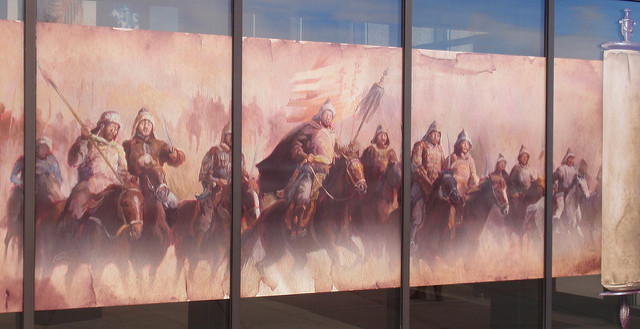Genghis Khan was the savage and ruthless military leader who is credited with unifying much of Eurasia and having founded the world’s largest empire in the thirteenth century. To do so, he led many military campaigns conquering one land after another, and, after the conquering, he declared his rule over the vanquished. Genghis Khan’s image as a ruthless and determined conqueror has often painted the Mongolians he led as being harsh and bloodthirsty. However, he and his armies were also willing to show much mercy.
His oldest but not directly related son was Jochi Khan. Genghis Khan’s wife was kidnapped, and when he rescued her, she had become pregnant with Jochi.1 Despite this fact, however, Genghis Khan never saw him as anything other than his own. Even on his deathbed, he contemplated appointing Jochi as a successor, as it was customary to pick the eldest son. One of Jochi’s step brother’s did not agree to this, being that Jochi wasn’t actually related by blood; Jochi replied to his step brother with, “‘I have never been told by my father the Qan that I was different from my brothers. How can you discriminate against me?”2

As he was treated like one of his father’s own, Jochi was given his own army at the age of twenty-six. This was popular among his family as his father was keen on delegating several military positions to family and friends; this further allowed his sons to develop their leadership skills.3 However, they would still take orders from their father, and Jochi was assigned to take over several villages, cities, and towns. On one of his assignments, Jochi was ordered to take over the town of Saganak around the year 1220.4 Jochi, being a smart man, knowing that he would indeed own the town afterwards, sent a local countryman to ask for the town’s surrender. Surely, he thought, they must receive the message much better coming from one of their own. He even made an agreement with the governor that the messenger would not be harmed nor would his people. This triggered an emotional response of the opposite desired result, in which the townspeople were insulted and killed the messenger despite the agreement. Jochi was very unhappy about the turn of events, and he decided to attack the town, killing all of its soldiers and half of its citizens. His message was clear: surrender or be destroyed.5
However, Jochi was still a sympathetic leader and would treat the people of towns with mercy, usually depending on the town surrendering immediately when requested to do so. He felt that there was no need for additional violence, and that he would ultimately end up being in charge of the town. There are accounts of towns going out of their way to surrender before any possible violence came to them, or after they knew they had lost. On one such occasion, both of Jochi’s strategic styles came into play. A small town with a weak military but a large wall surrounding it refused to surrender until after a three-day siege, and only when seeing that defeat was imminent. Jochi refused their surrender, since it was not made before he had exhausted his forces, and he took the town by force. He then ordered all the inhabitants to the outside of the wall. Instead of killing them, however, he merely got them out of the way, so that his army could loot their homes without any problems.6
Jochi went on to lead larger conquests with his family’s armies and his own, although he started growing farther away from his family and military duties.7 : A Historical Encyclopedia (Santa Barbara, California: ABC-CLIO, 2017), 162-163.] This version of peaceful conquest, coupled with several benefits of being under Khan’s rule (such as the unification of the silk road and the building of an infrastructure for the entire empire) meant that while a Mongolian invasion was always a looming threat, simply submitting to the superior Khan rule was not a terrible alternative.
- Berkshire Encyclopedia of China: Modern and Historic Views of the World’s Newest and Oldest Global Power, 2009, s.v. “Chinggis Khan,” by Timothy M. May. ↵
- Igor de Rachewiltz, The Secret History of the Mongols: A Mongolian Epic Chronicle of the Thirteenth Century (The Australian National University, 2015), 172. ↵
- Salem Press Encyclopedia, January 2016, s.v. “Mongol Empire’s military history,” by Michael Siler. ↵
- Jacob Abbott, Makers of History: Genghis Khan (New York and London: Harper & Brothers, 1901), 264. ↵
- Jacob Abbott, Makers of History: Genghis Khan (New York and London: Harper & Brothers, 1901), 265-266. ↵
- Jacob Abbott, Makers of History: Genghis Khan (New York and London: Harper & Brothers, 1901), 266-268. ↵
- Timothy May, The Mongol Empire: A Historical Encyclopedia [2 Volumes ↵



33 comments
Johnanthony Hernandez
Until reading your article I had not heard of Jochi Khan or of his coming to power. It’s interesting to see how in a society were the power was passed to the eldest son was given to a man who was not his true biological son. While the circumstances of Jochi’s being would be seen as indifferent to many now, at the time I am surprised that Genghis Khan didn’t pass on his power to his biological son. As well as his peaceful conquest view of taking territory opposed to his fathers way of taking it.
Michael Thomas
I found this article interesting because of how it details the life of Genghis Khan’s son, Jochi. Jochi’s step brother felt betrayed, since his father respected Jochi more than him. What made Jochi more distinct than his brothers is that he was more merciful by sending a messenger to ask the town to surrender. Overall, this article was good and informative.
Elias Garza
This article was attention grasping and I am glad I came across it. I believe Jochi’s step brother was in the right to feel betrayed towards his father and step brother. Being the blooded son, he should have gotten the respect Jochi received. On the other hand, family is family and blood should not determine anything: only loyalty should determine family.
Natalia Flores
I haven’t heard of the sons of Genghis Khan and hearing of at least one of his sons is amazing. I heard that Genghis Khan himself was merciful, but only to his own and seeing that Jochi appeared to be the same way is interesting. I didn’t know that Jochi came from Genghis wife, but was not blood related to Genghis Khan. Jochi’s handling of those who would not submit by wiping out almost everybody was brutal, but effective.
Didier Cadena
I have never heard of Jochi, so it was informative to read about him. I am not very familiar with the kin of Genghis Khan, so it was surprising that he cared so much about a son that was not even his. It was surprising to see so much compassion from a man whose father showed none, making Jochi his own man. The article does a great job of putting together information of someone whom I was not familiar with.
Megan Barnett
Good job putting this information into a story, however I found your take on the subject to be difficult to grasp. I now see that Jochi Khan was one of the nice Mongolians, but I feel that this accusation still does not make him a morally good person. I believe that you also did a very satisfying job of describing who Khan was and the difficulties he had fitting in with his brothers.
Sebastian Castro Ramos
I always thought of Genghis Khan as a barbaric warrior with no mercy or kindness, so it is a surprise to me that he treated Jochi as his own son, that he made Jochi his successor, and that he didn’t reproach Jochi’s peaceful way of taking over towns. Jochi’s policies when conquering are indeed merciful compared to many others who would only attack and siege. I guess people who fell under his rule didn’t feel subdued compared to the rule of others.
Richard Navarro
I found it interesting that Khan took another mans son in as his own and handed down his army to him. Jochi must have been a very good and influential leader to be over to easily take over cities, I wonder how many soldiers he lost during his raids. Its also interesting that he would actually show mercy to his victims during a time of attack.
Osman Rodriguez
The Khan era has always interested me, and of course, the person you mostly hear about is Genghis Khan. I had never heard of Jochi, but his story is intriguing. The fear and way he conquered, reminded me of Alexander the great. Mostly how some towns, when they knew Alexander was coming they would either try to put up a fight or simply surrender and accept him. One thing I really liked about the article was Jochi’s response to his step-brother.
Alexandria Martinez
I never thought of Genghis Khan as someone who would be kind of a nice or considerate person. In every story that I hear about him, he is a ruthless man. The fact that he considered Jochi as his own, even though he technically was not, is different than what I would think of him. Jochi is someone that I don’t really hear that much about, this article really shed some light on him for me. He seemed like a powerful man who knew how to accomplish what he planned.